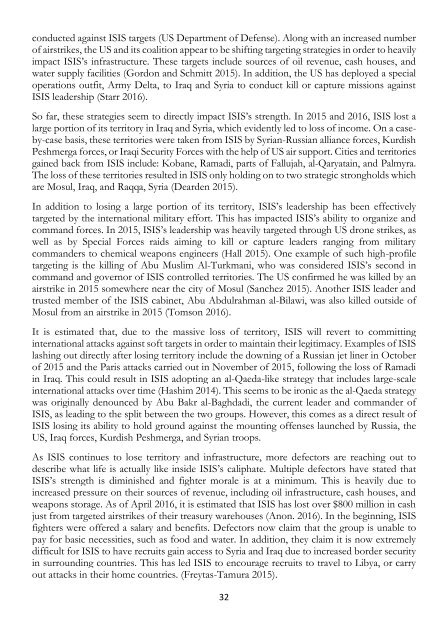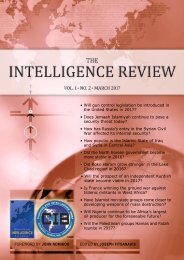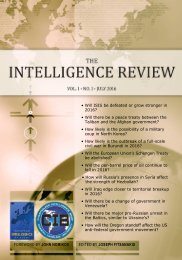The Intelligence Review | vol. 1 | iss. 1 |
This volume is the product of a collaboration between the European Intelligence Academy (EIA) and the Chanticleer Intelligence Brief (CIB), a student-run initiative supported by the Department of Politics at Coastal Carolina University in Conway, South Carolina, United States. Eleven CIB analysts tackle some of the most pressing and timely questions confronting intelligence observers today. Topics range from the price of oil to political stability in Venezuela, from the territorial cohesion of Iraq to the future of the Islamic State, and many other pressing subjects that feature daily in news headlines. CIB analysts propose carefully crafted and informed forecasts that outline future developments in some of the world's most unpredictable hot spots.
This volume is the product of a collaboration between the European Intelligence Academy (EIA) and the Chanticleer Intelligence Brief (CIB), a student-run initiative supported by the Department of Politics at Coastal Carolina University in Conway, South Carolina, United States. Eleven CIB analysts tackle some of the most pressing and timely questions confronting intelligence observers today. Topics range from the price of oil to political stability in Venezuela, from the territorial cohesion of Iraq to the future of the Islamic State, and many other pressing subjects that feature daily in news headlines. CIB analysts propose carefully crafted and informed forecasts that outline future developments in some of the world's most unpredictable hot spots.
- No tags were found...
You also want an ePaper? Increase the reach of your titles
YUMPU automatically turns print PDFs into web optimized ePapers that Google loves.
conducted against ISIS targets (US Department of Defense). Along with an increased number<br />
of airstrikes, the US and its coalition appear to be shifting targeting strategies in order to heavily<br />
impact ISIS’s infrastructure. <strong>The</strong>se targets include sources of oil revenue, cash houses, and<br />
water supply facilities (Gordon and Schmitt 2015). In addition, the US has deployed a special<br />
operations outfit, Army Delta, to Iraq and Syria to conduct kill or capture m<strong>iss</strong>ions against<br />
ISIS leadership (Starr 2016).<br />
So far, these strategies seem to directly impact ISIS’s strength. In 2015 and 2016, ISIS lost a<br />
large portion of its territory in Iraq and Syria, which evidently led to loss of income. On a caseby-case<br />
basis, these territories were taken from ISIS by Syrian-Russian alliance forces, Kurdish<br />
Peshmerga forces, or Iraqi Security Forces with the help of US air support. Cities and territories<br />
gained back from ISIS include: Kobane, Ramadi, parts of Fallujah, al-Qaryatain, and Palmyra.<br />
<strong>The</strong> loss of these territories resulted in ISIS only holding on to two strategic strongholds which<br />
are Mosul, Iraq, and Raqqa, Syria (Dearden 2015).<br />
In addition to losing a large portion of its territory, ISIS’s leadership has been effectively<br />
targeted by the international military effort. This has impacted ISIS’s ability to organize and<br />
command forces. In 2015, ISIS’s leadership was heavily targeted through US drone strikes, as<br />
well as by Special Forces raids aiming to kill or capture leaders ranging from military<br />
commanders to chemical weapons engineers (Hall 2015). One example of such high-profile<br />
targeting is the killing of Abu Muslim Al-Turkmani, who was considered ISIS’s second in<br />
command and governor of ISIS controlled territories. <strong>The</strong> US confirmed he was killed by an<br />
airstrike in 2015 somewhere near the city of Mosul (Sanchez 2015). Another ISIS leader and<br />
trusted member of the ISIS cabinet, Abu Abdulrahman al-Bilawi, was also killed outside of<br />
Mosul from an airstrike in 2015 (Tomson 2016).<br />
It is estimated that, due to the massive loss of territory, ISIS will revert to committing<br />
international attacks against soft targets in order to maintain their legitimacy. Examples of ISIS<br />
lashing out directly after losing territory include the downing of a Russian jet liner in October<br />
of 2015 and the Paris attacks carried out in November of 2015, following the loss of Ramadi<br />
in Iraq. This could result in ISIS adopting an al-Qaeda-like strategy that includes large-scale<br />
international attacks over time (Hashim 2014). This seems to be ironic as the al-Qaeda strategy<br />
was originally denounced by Abu Bakr al-Baghdadi, the current leader and commander of<br />
ISIS, as leading to the split between the two groups. However, this comes as a direct result of<br />
ISIS losing its ability to hold ground against the mounting offenses launched by Russia, the<br />
US, Iraq forces, Kurdish Peshmerga, and Syrian troops.<br />
As ISIS continues to lose territory and infrastructure, more defectors are reaching out to<br />
describe what life is actually like inside ISIS’s caliphate. Multiple defectors have stated that<br />
ISIS’s strength is diminished and fighter morale is at a minimum. This is heavily due to<br />
increased pressure on their sources of revenue, including oil infrastructure, cash houses, and<br />
weapons storage. As of April 2016, it is estimated that ISIS has lost over $800 million in cash<br />
just from targeted airstrikes of their treasury warehouses (Anon. 2016). In the beginning, ISIS<br />
fighters were offered a salary and benefits. Defectors now claim that the group is unable to<br />
pay for basic necessities, such as food and water. In addition, they claim it is now extremely<br />
difficult for ISIS to have recruits gain access to Syria and Iraq due to increased border security<br />
in surrounding countries. This has led ISIS to encourage recruits to travel to Libya, or carry<br />
out attacks in their home countries. (Freytas-Tamura 2015).<br />
32





